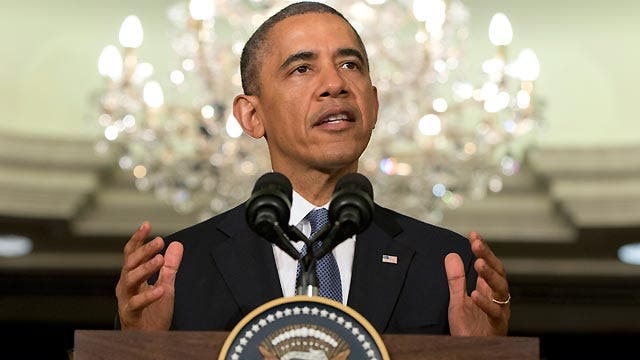Obama launches vigorous defense of his foreign policy
Ed Henry reports from Manila, Philippines
The Obama administration took a shot at Vladimir Putin's close associates -- and perhaps the Russian president's own pockets -- by ratcheting up sanctions on officials and companies tied to him in a bid to compel Moscow to ease its intervention in eastern Ukraine.
U.S. congressional lawmakers, and even President Obama himself, have questioned whether new sanctions will have an impact. As he announced the package, Obama acknowledged that "we don't yet know whether it's going to work."
But the White House said it was announcing new sanctions because Russia "has done nothing" to honor its commitment from a recently struck diplomatic deal and "in fact has further escalated the crisis."
A White House statement said the administration would target seven Russian government officials, "including two members of President Putin's inner circle" -- hitting them with an asset freeze and U.S. visa ban. Seventeen companies "linked to Putin's inner circle" would also be subject to an asset freeze.
Further, the Commerce Department targeted 13 of those companies with additional restrictions, and the administration plans to deny export license applications for "any high-technology items that could contribute to Russia's military capabilities."
Obama announced the sanctions at a news conference in Manila, where he is making the Philippines his last stop on a four-country tour of Asia.
"The goal here is not to go after Mr. Putin personally," Obama said. "The goal is to change his calculus with respect to how the current actions that he's engaging in could have an adverse impact on the Russian economy over the long haul."
The president has been building a case for this new round of sanctions throughout his trip, both in his public comments and in private conversations with European leaders.
The new sanctions are intended to build on earlier U.S. and European visa bans and asset freezes imposed on Russian officials, including many in Putin's inner circle, after Moscow annexed the Crimean Peninsula from Ukraine last month. White House officials say they decided last week to impose the new sanctions after determining that Russia had not lived up to its commitments under a fragile diplomatic accord aimed at easing the crisis in Ukraine. But the U.S. held off on implementing the sanctions in order to coordinate its actions with the European Union, which could also announce new penalties as early as Monday.
The failed diplomatic accord reached in Geneva called on the Kremlin to use its influence to get pro-Russian insurgents to leave the government buildings they have occupied in eastern Ukraine. But those forces have not only balked at leaving those buildings, but have also stepped up their provocation, including capturing European military observers.
U.S. lawmakers increasingly question whether sanctions are having an effect. Top Republican senators dismissed the new round as too "tepid" to change Putin's behavior.
Sen. Bob Corker, R-Tenn., called it a "slap on the wrist," and urged the U.S. to target bigger entities like Gazprom and major financial institutions.
"The administration's tepid, incremental sanctions are insufficient given Russia's continued occupation of Crimea and ongoing actions to fuel unrest in eastern Ukraine," Sen. Kelly Ayotte, R-N.H., said in a statement.
Questioned at a press conference in Manila on the effectiveness of his foreign policy, Obama defended his administration's progress in building partnerships, like those in the Asia-Pacific region, even if "that may not always be sexy."
He said that criticism of his foreign policy is often "directed at the failure to use military force," but questioned why "everybody is so eager to use military force after we've just gone through a decade of war at enormous costs to our troops and to our budget."
Of his own approach, he said: "You hit singles, you hit doubles; every once in a while we may be able to hit a home run. But we steadily advance the interests of the American people and our partnership with folks around the world."
Officials targeted in the latest round of sanctions include: Oleg Belavantsev, Russia's "presidential envoy" to Crimea; Dmitry Kozak, Russia's deputy prime minister; and Evgeniy Murov, director of Russia's Federal Protective Service. Sanctioned companies include The Volga Group, rail freight operator Transoil; and InvestCapitalBank.
European diplomats were set to meet in Brussels Monday to discuss slapping asset freezes and travel bans on more officials associated with Russia's actions on Ukraine. The EU has so far sanctioned 33 individuals over the Crimea annexation.
Neither the U.S. nor Europe plans to announce broader sanctions on Russia's key industries this week, though Obama said they were keeping those measures "in reserve" in case the situation worsens and Russia launches a full military incursion into eastern Ukraine. Among the targets of those so-called sector sanctions could be Russia's banking, defense and energy industries.
Much of Obama's outreach to European leaders in recent weeks has focused on building support for the sector sanctions. The EU is Russia's biggest trading partner, giving it much greater economic leverage over Moscow than the U.S. has. However, the EU treads more carefully in imposing sanctions since Russia is also one of its biggest oil and gas suppliers.
The Associated Press contributed to this report.













































